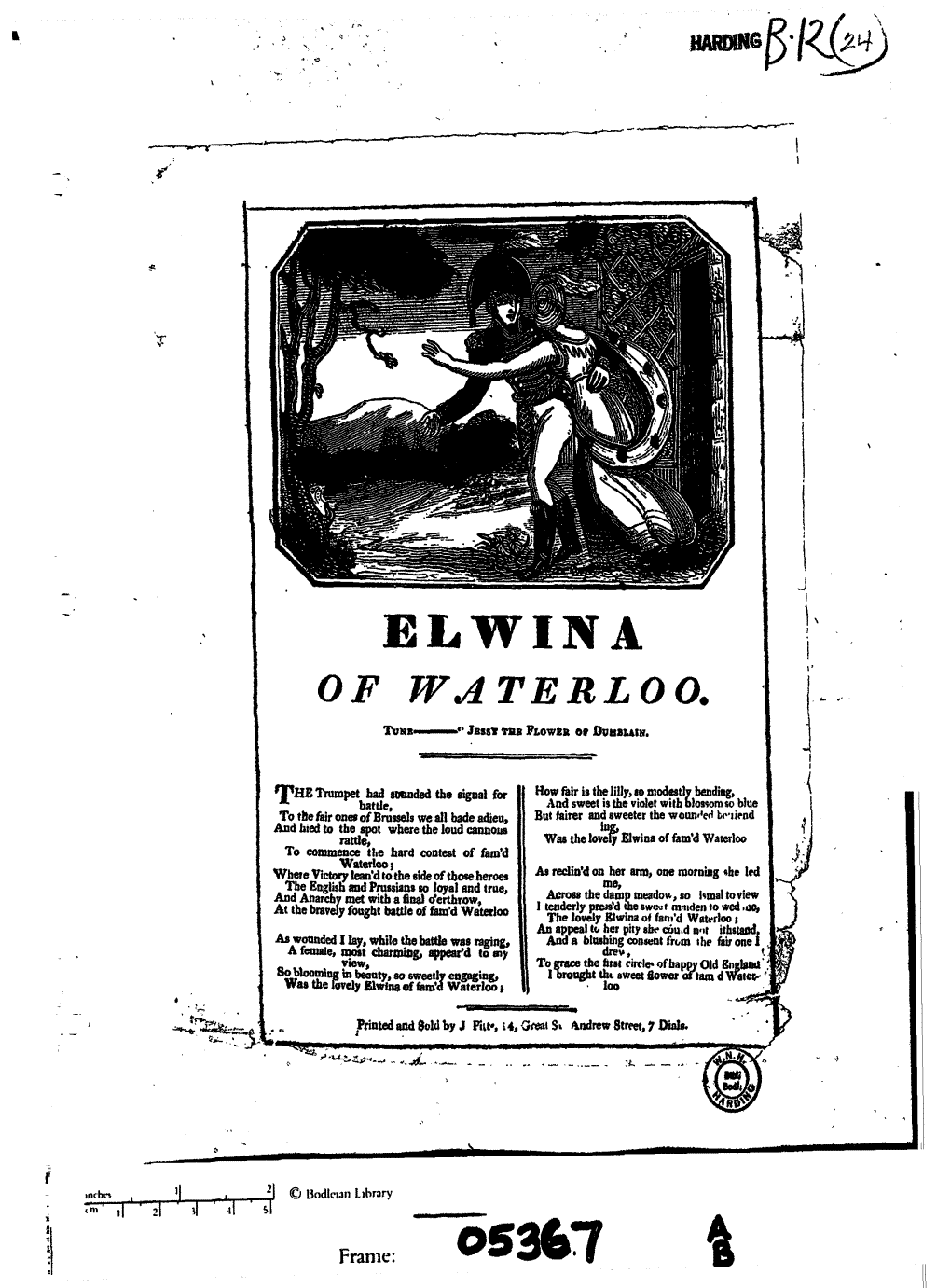I found this song almost by accident and have copied details of its origins verbatim from Andy Turner’s blog: On this is also an excellent recording of Andy singing the number accompanied on his concertina. My version of the song includes two extra verses (guess which) and takes a different slant – but, I think, with a more likely outcome. The wounded soldier’s dream of marriage to a camp follower (as no doubt she was) seems to me improbable. Nevertheless, such daydreams were no doubt one thing which kept soldier’s minds off the harsh realities of war. The change from Brussels to Bristol also seemed unnecessary so I reverted to the original including ‘fair maids’ rather than ‘fair ones’ which was, I assume, simply Victorian prudery. Incidentally, as is my wont, I’ve also taken considerable liberties with the melody – not deliberately but just the way it came out.
‘Lovely Elwina was collected by Vaughan Williams, some 89 years after the battle, from Mr Leary, a native of Hampshire, but then living in alms houses in Salisbury. Vaughan Williams recorded it as either ‘The Battle of Waterloo’ or ‘Leaving Waterloo’ (I think – I really struggle with his handwriting). I learned the song from Roy Palmer’s book Folk Songs collected by Ralph Vaughan Williams, where it is given as ‘Elwina of Waterloo’ – this is the title given to the song in its frequent appearances on broadsides. Roy writes that Mr Leary’s version seems to be unique but in fact now, with the benefit of a further thirty years’ research, not to mention the internet, we can point to one other collected version, from Joseph Alcock of Sibford Gower in Oxfordshire.
The beginning of the song is set in Brussels, on the eve of battle. I always picture a scene from Vanity Fair, although I’m ashamed to say my images come from an old BBC television adaptation, rather than from the book itself, which I’ve never read. The opening lines of broadside versions run:
The Trumpet had sounded the signal for battle,
To the fair ones of Brussels we all bade adieu
But Mr Leary had changed Brussels to Bristol, and I’ve always followed his example.
The ferocious battle itself (total casualties and losses 55 000 according to Wikipedia) features only in the background: our hero is wounded, but it’s not, it would seem, anything too serious, and the song focuses on the young lady he meets, and who by the end of the song is set to become his bride.
I used to sing this song with Chris Wood in the 1980s, and it’s now set to become part of the Magpie Lane repertoire – although typically for Magpie Lane, not in time for the Waterloo bicentennial!’
Andy Turner – https://afolksongaweek.wordpress.com
ELWINA of WATERLOO
The trumpets are sounding the signal for battle,
To the fair maids of Brussels, we all bid adieu,
And hold to the spot where the loud cannons rattle,
To commence the hard contest, commence the hard contest,
Commence the hard contest, of famed Waterloo.
So bring forth the muskets and let loose the canon,
Advance now me brave lads you know what to do.
But I was shot down and could go on no further.
And thought I were dying, x3 …at famed Waterloo.
As wounded I lay while, the battle was raging,
A maiden most charming appeared to my view;
So blooming in beauty, so sweetly engaging,
My lovely Elwina, x3. …of famed Waterloo.
So sweet was the lily, so modestly bending,
And sweet were the violets in blossom so blue;
More fairer and sweeter was my dear befriended,
My lovely Elwina, x3 …of famed Waterloo.
I reclined on her arm on that morning to lead me,
Across the damp meadows so dismal to view;
I tenderly pressed that sweet maiden to wed me,
And bring that sweet flower, x3 …from famed Waterloo.
Back home now in England the crowds are all cheering,
When seeing our redcoats advance into view.
For Wellington’s army has stirred this great nation,
But I left my heart there, but I left my heart there,
But I left my heart there in famed Waterloo.

